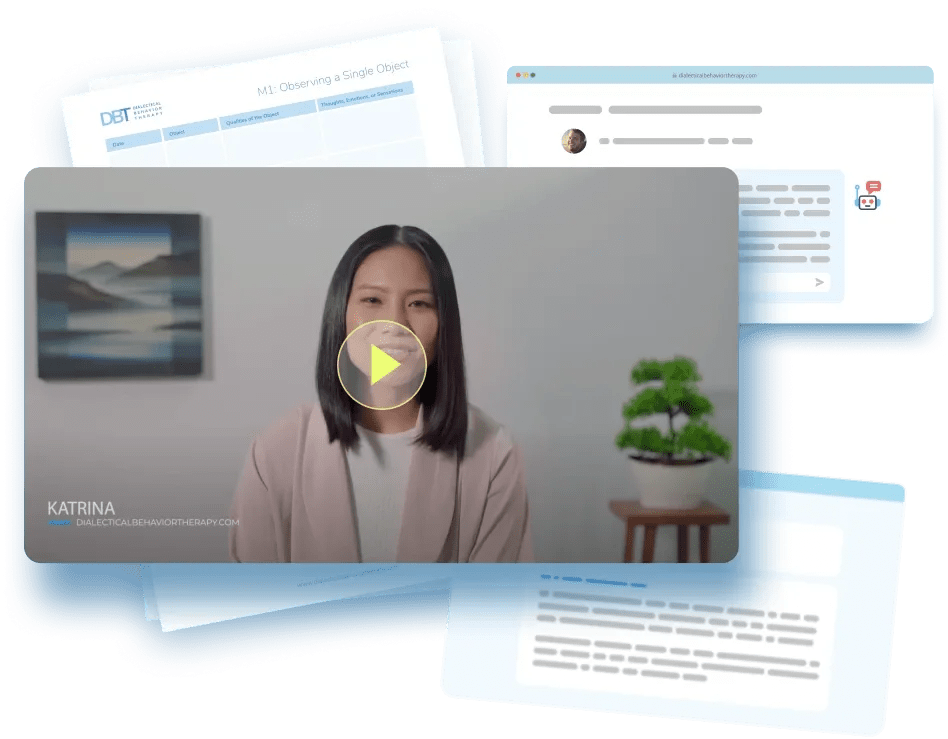E10: Coping Ahead
Virtual Coach
Work step-by-step through the Emotion Regulation exercise with the virtual coach.
Introduction
Coping ahead is all about making a plan for ourselves for dealing with a stressful situation we will encounter in the future. We prepare for the stress situation (internal or external), by thinking about how to apply the skills we learned in the previous lessons and rehearse using them in our head. This will help you apply the skills that you have already learned when you need them.
Coping Ahead
Step One: Imagine and describe a situation
By now, in the previous exercises you probably already worked on thinking about a situation that is problematic for you - an event that often happens and causes you to feel overwhelming emotions. It can be anything happening from the outside world to an internal event (emotion, thought) that you have and that triggers overwhelming emotions. Write down how this situation usually goes, and describe it sufficiently.
Step Two: What DBT skill do you want to apply?
Now, go back through the exercises from this module and think about which one of the strategies and techniques we worked on is the most suitable solution for you for the problematic situation. Is it the exercise problem solving? Maybe it's emotion exposure or balancing emotional urges. Take your time and decide which DBT skill you want to use.
Step Three: Rehearse it in your head
Now, try to imagine how you would apply the skill you picked in the situation. What exactly would you do? How does this fit into the problematic situation? Try to imagine in it in a detailed way and write down the steps in the worksheet provided.
Work on this step until you feel like you are prepared to apply this skill. And don't worry, this is still work in progress and it is okay if the strategy is not fully effective or effective right away.
Example
1. Imagine and describe a situation: I always feel very socially anxious around my wife's friends. It's not that there is something wrong with them, it's just that I am too self-conscious and it's really hard for me to socialize with them. It's too much pressure and I usually avoid all of them.
2. What DBT skill do you want to apply? Going through the exercises, I think that the most suitable emotion regulation skill I can use for this situation is Doing the opposite of your emotional urges. I feel a little scared and anxious, and ashamed about myself, so I know that the opposite of that would be to stay in the anxiety-provoking situation and approach my wife's friends. There is objectively nothing about me that is wrong, and I should try it.
3. Rehearse it in your head: When we go out on Friday, I will not try to cop out of the situation. I will willingly get prepared and go out with them. I know that everybody will be open and glad that I came. If I start sweating and over thinking everything I say, I will simply remind myself that I overestimate how "terrible" this is and just keep socializing. Instead of over thinking my words I will lean into their stories and try to really listen to them. Maybe I will feel anxious and ashamed, but the emotions are temporary and I am enthusiastic that they will transform into something other than fear and shame. If it doesn't happen right away, that's okay. This is a skill that needs practice.
FAQs
How can I be sure which emotion regulation skill is the most suitable for the second part Coping ahead?
Go over the exercises and the different skills and strategies and try to see what each on of them applies to best. Often, there is more than one skill we can apply to a situation - the approach is different but the end result is always about helping you achieve better regulation of the overwhelming emotions you experience. Pick a DBT skill and try it out. Maybe you will find that it fits the situation perfectly well. If you think that maybe there is another skill that you can try and will work better, you can try that next time you find yourself in the problematic situation.
Disclaimer
If you have any behavioral health questions or concerns, please talk to your healthcare or mental health care provider. This article is supported by peer-reviewed research and information drawn from behavioral health societies and governmental agencies. However, it is not a substitute for professional behavioral health advice, diagnosis, or treatment.

